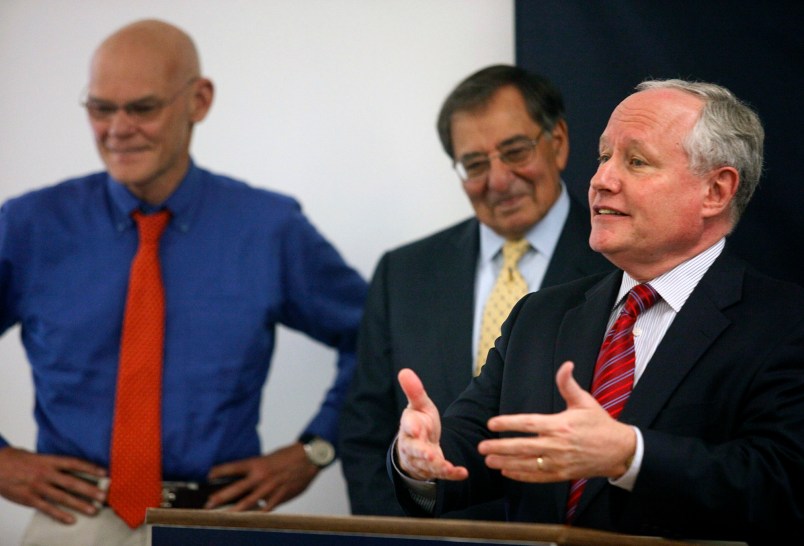In light of Obamacare achieving its goal of 7 million initial insurance sign-ups, William Kristol’s 1993 memo urging his party to block health care reform at all costs seems prescient. In it, the then-GOP operative’s message was remarkably candid: it’s a “serious political threat to the Republican Party.”
Kristol argued that it would cast Democrats as protectors of the middle class and “strike a punishing blow” to GOP ideals about the evils of government.
“[T]he long-term political effects of a successful Clinton health care bill will be even worse — much worse,” Kristol wrote. “It will relegitimize middle-class dependence for ‘security’ on government spending and regulation. It will revive the reputation of the party that spends and regulates, the Democrats, as the generous protector of middle-class interests. And it will at the same time strike a punishing blow against Republican claims to defend the middle class by restraining government.”
Two decades later, Democrats have achieved their century-long dream, defeating the GOP’s revived Kristol-esque strategy to destroy health care reform at all costs. Obamacare unexpectedly crossed its first big milestone last week with 7 million sign-ups on the exchanges. While the law still faces many challenges, conservatives who broadly predicted it would collapse under its own weight are forced to reckon with the unsettling fear that health care reform might succeed.
Few understood the dilemma better than Senate Minority Leader Mitch McConnell (R-KY), who made it his personal mission to kill health care reform from its inception in 2009. His aggressive whip operation led to unanimous GOP opposition to the effort and a variety of scorched-earth tactics aimed at scuttling it. But the bill passed anyway. And in a cruel twist, it is performing especially well in his home state, cutting Kentucky’s uninsured rate by 40 percent. But McConnell, who faces re-election this year, isn’t relenting: upon news of the 7 million signups, he maintained that the law was a “catastrophe.”
Conservative policy wonks are more shaken, conceding that the law appears able to sustain itself and warning that simply repealing it is no longer feasible because it would strip away benefits from up to millions of Americans. Variations of that argument have been made by the New York Times columnist Ross Douthat, conservative health care consultant Avik Roy, National Review senior editor Ramesh Ponnuru and Kristol himself, who is now the editor of the Weekly Standard.
These conservatives are confronting the realities of Obamacare, which include roughly 7 million signed up on the exchanges, 3 million new Medicaid enrollees and 3 million young adults on their parent’s plan. They argue that the benefits are popular and can’t simply be taken away without a political backlash. But elected Republicans now face a difficult choice: rescind these benefits or demoralize their right-wing base, which remains animated for total destruction of the health law. And so GOP lawmakers haven’t flinched in their quest for repeal as reporters force them to confront the impracticality of undoing Obamacare.

“I don’t buy that for a second,” said House Budget Chair Paul Ryan (R-WI), maintaining that “the architecture of this law is so fundamentally flawed that I think it’s going to collapse under its own weight.” Speaker John Boehner (R-OH) said Obamacare “continues to wreak havoc on American families” and vowed that House Republicans “will continue to work to repeal this law.”
The GOP’s political inclination to dig in runs deeper than keeping conservatives energized for the November congressional elections. It’s about preserving their party’s brand. Even minor concessions of Obamacare’s potential for success would gravely damage their credibility after relentless warnings for years that the law was fatally flawed, irreparably damaging to the health care system and ruinous to economic freedom. They don’t have a good option other than to stay the course and keep highlighting Obamacare’s downsides and flaws — of which there are plenty — at least through the 2014 election, where the fundamentals so strongly favor them that they’re unlikely to pay a price.
Indeed, Obamacare remains a vulnerability for Democrats in the mid-terms, threatening to damage incumbent senators in red states where the law remains unpopular. Republicans have cushioned the near-term blow by uniting against Obamacare in an unparalleled way, which has kept their base voters animated.
The long-run, however, is a different story. By 2016, the political cost of repeal will skyrocket as Obamacare is projected to cover 30 million Americans. Republicans were somewhat fortunate that Social Security and Medicare — which they also fought tooth and nail at the time, echoing rhetoric they use against Obamacare — weren’t named after a Democratic president. If the Affordable Care Act succeeds, the public will know who to attribute it to.
Kristol didn’t respond to a request for comment on this article. His 1993 memo emphasized the political potency of health care reform for Democrats.
“‘Health care will prove to be an enormously healthy project for Clinton… and for the Democratic Party.’ So predicts Stanley Greenberg, the president’s strategist and pollster,” he wrote. “If a Clinton health care plan succeeds without principled Republican opposition, Mr. Greenberg will be right.”






